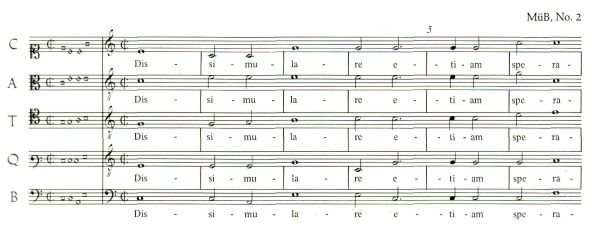| Version imprimante |
La musique de Cipriano De Rore
Dissimulare etiam sperasti - Quin etiam hiberno - Me ne fugis
A. Type:
Motet
B. Nombre de voix:
5-7vv
C. Auteur du texte:
Vergilius, Publius Maro
Ct. Texte:
(avec traduction en Néerlandais Français Anglais)
: Lire
E. Se trouve dans les sources de partitions suivantes:
suivant: Bernstein, Jane A. (1998) :
-
1567 :
{Bernstein} - 289
: 'Striggio, Rore, Il Cicalamento.'
suivant: CMME Project(The) - Dumitrescu (e.a.), Theodor :
-
{Census} - ParisBNC 851 ("Bourdeney Manuscript")
: '{Census} - ParisBNC 851 ("Bourdeney Manuscript")'
suivant: Fuhrmann, Christina :
-
1567 :
{RISM} - 1567_23
: 'Il Cicalamento delle donne al bucato. Et la caccia di Alessandro Striggio, con un lamento di Didone ad Enea, per la sua partenza, di Cipriane Rore, a quatro, cinque, sei, & sette voci. Di nuovo poste in luce per Giulio Bonagionta da San Genesi musico delle illustriss. signoria di Venetia in San Marco & con ogni diligentia corretti.'
suivant: Meier, Bernardus (1975) :
-
1559 :
BSB Mus.ms. B(1 (1559)
: 'BSB Mus.ms. B(1 (1559)'
F. Partition moderne:
See 'Meier, Bernardus : Cipriani Rore Opera Omnia, Vol VI : Motets' : p.6
I. Incipit:
 Source:
'Meier, Bernardus : Cipriani Rore Opera Omnia', American Institute of Musicology
Source:
'Meier, Bernardus : Cipriani Rore Opera Omnia', American Institute of Musicology
J. Discographie:
1 - ' Beruhmte Liebespaare ' : [seulement la 3ème partie : 'Me ne fugis'] , Vokalensemble Canticum Antiquum (Forderkreis fur Alte Musik Marburg)2 - ' Chansons de la Renaissance ' : [Edition originale sur CD : Cipriano de Rore : Missa Praeter Rerum Seriem (Huelgas Ensemble)] , Huelgas Ensemble, The Hilliard Ensemble (Harmonia Mundi)
3 - ' Cipriano De Rore - Portrait of the Artist as a Starved Dog (graindelavoix) , Graindelavoix, Björn Schmelzer (Glossa)
4 - ' Cipriano de Rore : Missa Praeter Rerum Seriem (Huelgas Ensemble) , Huelgas Ensemble, Paul Van Nevel (Harmonia Mundi)
5 - ' Imago: Virgilio nella musica del Rinascimento , De Labyrintho, Walter Testolin (Stradivarius)
6 - ' The Flemish masters Vol. 1 , Pomerium Musices, Alexander Blachly (Classic Masters)
7 - ' The Magic of Polyphony (3 Cd's) , Huelgas Ensemble, Paul Van Nevel (Sony Music)
Jr. Emission radio:
1 - ' Klara 2006-09-22 : Huelgas Ensemble - Concert - Lassus en De Rore , Huelgas Ensemble (-)L. Références:
Références avec citation/commentaire:
1 : Meier, Bernardus,
Cipriani Rore Opera Omnia, Vol I : Motets
(American Institute of Musicology (AIM), 1959)
- p.III
: 'The introductory words Illuxit nunc sacra dies, as well as the words celebranda per orbem (bars 13-15) and salus (23 f.) used further on in the same motet, are obviously emphasised by rapidly ascending movement or high position, particularly in the Cantus.'
2 : Fuhrmann, Christina,
Gossip, Erotica and the Male Spy in Alessandro Striggio's Il Cicalamento delle donne al bucato (1567)
()
in : Borgerding, Todd : Gender, Sexuality, and Early Music, p.167 - (2002)
- p.193
: Il Cicalamento was published by Girolamo Scotto in 1567 and reprinted by the same firm in 1569 and 1584. The first edition paired the piece with another of Striggio’s madrigal comedies and a Rore work: Il Cicalamento delle donneal bucato, et la caccia di Alessandro Striggio, con un lamento di Didone ad Enea, per la sua partenza, di Cipriano Rore… (Venice: Scotto, 1567). The reprints replaced De Rore with Striggio's third and final madrigal comedy: Il cicalamento delle donne al bucato et la caccia di Alessandro Striggio, a quarto, cinque sei e sette voci, con il gioco di primiera a cinque voci. (Venice: Scotto, 1569). See Jane A. Bernstein: Music Printing in Renaissance Venice: the Scotto Press (1539-l572) (Oxford: Oxford University Press. 1998), 714-16, 791-93. Modem editions can be found in: Bonaventura Somma. Ed. Capolavori polifonici del secolo XVI. Vol. 4 (Rome: Edizioni de Santis, 1947); and sections 1-3 only) Angelo Solerti, "Primi saggi del melodramma giocoso," Rivista musicale italiana 12 (1905): 814-38; 13 (1906): 91-112. 244-57.
3 : Einstein, Alfred,
The Italian Madrigal (vertaald naar het Engels door Alexander H. Krappe, Roger H. Sessions en Oliver Strunk)
(Princeton University Press, New Jersey, 1949)
- p.386
: '[. . .] the great tripartite scene of Dido's death from the fourth book of the Aeneid (305-319).'
Références sans citation:
4 : Owens, Jessie Ann, Cipriano de Rore's Setting of Dido's Lament: The Beginning of the seconda pratica (, 2009)
5 : Abraham, Gerald,
The New Oxford History of Music, IV, The age of humanism; 1540-1630
(Oxford University Press, London, New York, Toronto, 1968)
- p.291
Page (re)travaillée la dernière fois :
30/06/2022 20:08:42
Mon code :
#6273 (M_6_6)